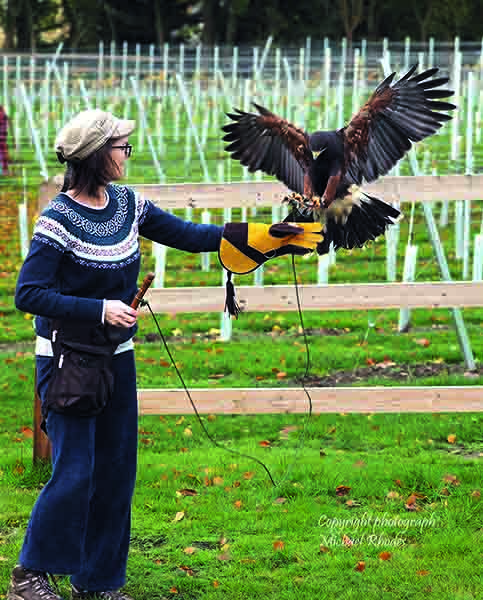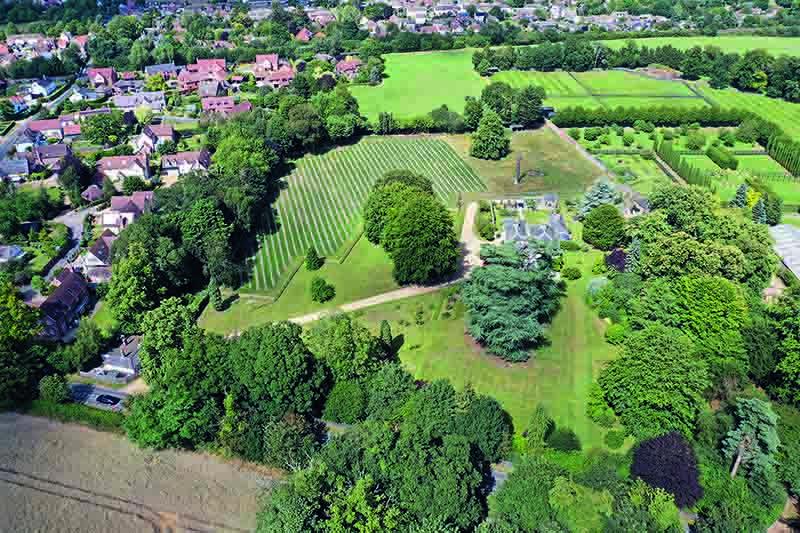Retired surgeon Dr Michael Rhodes talks to Vineyard about what it’s like to run a hobby vineyard and contract winery in Thurston, Suffolk.
How did you get into the English wine industry?
My lifelong interest in wine started after discovering the local weinfests while working in Ingelheim am Rhein in the 1970s. A time working in Australia in the 1990s cemented this fascination and a promotion and a new house in Norfolk with a cellar brought the opportunity to buy and collect wines from all over the world.
Turning 50, having a mid-life crisis, I turned to my wife, Irene, and said: “I wonder how difficult it would be for us to make wine in Norfolk?” I found a commercial vineyard a bike ride away from us in Attleborough so I ‘cold called’ the owner, Michael McCauly, who was amazingly welcoming and friendly. We went to help with harvest and as we left, Mike offered us a bin with 35kgs of Rondo grapes and said jovially: “If you want to make wine, why not have a go with these!”. We did and we made some truly undrinkable wine!
Where did you learn to make wine?
I quickly realised that there was more to making drinkable wine than simply reading a book and trying to follow the instructions. I completed many courses at Plumpton College, but perhaps most usefully we took several trips to Australia and New Zealand where we met a myriad of winemakers who were generous with their time and knowledge.
Our wines gradually improved, and four years ago we were asked to make wine for four vineyards. Amongst them was our main collaborator, Ian Pettitt whose two acre retirement hobby vineyard was the source of most of our fruit until 2019. The commonest wines we make are Bacchus, Solaris, Pinot noir and Rondo rosés and sometimes red.
How would you describe the ethos of the estate?
Thurston Place has a rich history, so it is imperative that the new vineyard fits in with the house and gardens and enhances the property rather than detract from it as a home. We hope that by ploughing up two long under-utilised horse paddocks we have succeeded in this aim.
As for winemaking, our ethos is attention to detail and to make the best possible wines from small batches of grapes. Both Irene and I do all the work in the vineyard and winery together, so we are not physically able to scale up production to more than 10,000 bottle per annum. On top of that our aim has always been to make wines which we can give to friends to drink and for them to be certain that “this can’t have been made in England”.
What’s in the winery?
As our first winery expanded, our garden in Attleborough was quickly starting to resemble an industrial estate. The final straw came when a pallet of bottles was delivered, the lorry got stuck in the gate, demolished a tree and Irene issued an ultimatum, either we had to scale back on winemaking or move. So, 18 months ago, we moved to Thurston Place, Suffolk, a property with 7.5-acres, including a lovely south facing slope, as well as an outbuilding for the winery.
We renovated an old stable block into a functioning winery in time for harvest 2018. Our main press is a half-tonne pneumatic machine, which was installed just hours before the first delivery of Bacchus! Our largest tanks are 675-litres, and as we make wine for several smaller hobby vineyards, we have quite a lot of 290-litre tanks. In total we have made wine for seven different vineyards so far, although once our own vines mature it may be difficult to keep this up.
Tell us about your terroir…
Over the winter of 2018/19 a local farmer helped us deep plough and prepare a 2-acre site and we had the property rabbit and deer fenced in readiness for planting. Having German connections, I knew Ernst Weiss who put us in touch with James Dobson and Vine-Works planted our vines at the end of April 2019. We planted 1,000 Pinot noir précoce, 1000 Bacchus and 200 Rondo. The soil is mostly sand and very free draining, so we were grateful for a wet summer to allow the vines to get established. The south facing slope is interesting because in winter there can be frost at our front door, but the top of the vineyard can be 12 degrees warmer by 11am in the morning.
What inspired you to want to make wine for other people?
It happened quite by accident. We had been gradually making better wine and it was becoming saleable. Chris Hatto approached us saying he had a friend who wanted a winemaker and he felt we might get on together, so he introduced us to Ian Pettit. We went on to win a silver medal for the first Bacchus we made for Ian and this led to other approaches. It is a retirement hobby, so, although we don’t want to lose money, the deciding factor is not earning money but the passion and character of the vineyard owner. If we feel we are being treated like a hired hand, then we don’t get involved. If we feel we can be part of their passion and are treated as equals we will consider taking on new clients.
Do you have any unusual vineyard pests and how do you deal with them?
Thurston Place was home to hundreds of rabbits when we moved in, not to mention dozens of squirrels, a plague of pigeons and a large rookery on our northern boundary. Faced with so many pests, I got a shotgun license, but it was pointless because as quickly as I shot the rabbits, ten more appeared; we did have some nice rabbit stew though!
We went for a day’s experience at Lavenham falconry and flew in Lavenham Brook Vineyard, who used the local falconry to control pests. I was a bit nervous about this large flapping killing machine on my arm, but Irene took to it like she had done it all her life. As a result of the day, Irene decided to take on falconry as a retirement hobby and so she took the full course and bought Ruby our Harris Hawk, who is big and strong enough to deal with rooks. Add to that a couple of vineyard dogs in the form of a 7-month-old Golden Retriever and a Cairn Terrier and we haven’t seen a rabbit for months!
What is the biggest challenge of being a contract winemaker?
In the USA and Australia, the winemakers are the stars, but in the UK the vineyard takes all the credit for the wine. I’m sure the balance is somewhere in the middle but the anonymity of winemakers in the UK is interesting. The biggest challenge for us is finding vineyard owners who we are happy to work with and who appreciate that it is a 50/50 partnership between grower and maker. A challenge this year was being asked to turn water into wine by several growers whose grapes were wet and unripe.
What is the best award/recognition you have received for the wines?
Over the years, the wines we have made have won numerous medals, but Irene and I were absolutely delighted to have produced both of the rosé wines which were named joint best rosé in East Anglia in the 2019 WineGB East Anglia competition. One for Ian Pettit at Burnt Foot and the other for Nick Watson at Cooperscroft.
What do producers need to consider when looking for a contract winemaker?
The most important thing for small volume winemakers like us is the relationship between grower and maker. We devote a whole day to each delivery so it is crucial to choreograph things carefully and we also have to agree bottling and pickup times for finished wine as we cannot store thousands of bottles for customers. People chose us because we have won medals every year and also because we offer a bespoke service for smaller customers who might struggle to have a wine made from small parcels of 500kg or 1000kg.
Do you think there is a shortage of winery facilities in the UK?
If I was 25 years younger (and had not been a surgeon) I would be looking for investors to set up a big commercial winery. It is amazing the number of new vines being planted all over England and Wales but there seems little thought about what will happen to the grapes in three to four years’ time. There seems to be a perception that “we’ll sell the grapes”, without the questions of to whom and for how much being addressed. I also think there is a niche market for producing smaller batches of wine (under 1,000 bottles per annum) because many with small patches of land are starting “hobby vineyards” but don’t want to set up a winery themselves.
What’s on the cards?
Our Thurston Place Wines will be released fully in 2021 when our vineyard starts producing. In the meantime, we have made small batches from grapes purchased from elsewhere as a way of introducing the brand to local pub and restaurant owners. We’d like to have the brand recognised in Bury St. Edmunds, as we are the closest vineyard to the town and hope to supply to local businesses and residents.
Finish this sentence: In ten years’ time…
We would love to be recognised for producing small quantities of excellent English wine – the Vin Perdu of Suffolk if you like!





